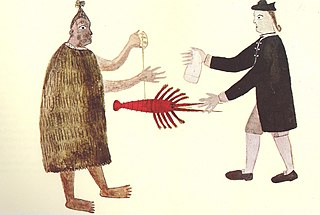
Kiwi or kiwis are flightless birds native to New Zealand, in the genus Apteryx and family Apterygidae. Approximately the size of a domestic chicken, kiwi are by far the smallest living ratites.

Oceania is a geographic region comprising Australasia, Melanesia, Micronesia and Polynesia. Spanning the eastern and western hemispheres, Oceania covers an area of 8,525,989 square kilometres (3,291,903 sq mi) and has a population of 40 million. Situated in the southeast of the Asia-Pacific region, Oceania, when compared to continental regions, is the smallest in land area and the second smallest in population after Antarctica.

Wellington is the capital city and second most populous urban area of New Zealand, with 418,500 residents. It is located at the south-western tip of the North Island, between Cook Strait and the Remutaka Range. Wellington is the major population centre of the southern North Island, and is the administrative centre of the Wellington Region, which also includes the Kapiti Coast and Wairarapa. Its latitude is 41°17′S, making it the world's southernmost capital of a sovereign state. Wellington features a temperate maritime climate, and is the world's windiest city by average wind speed.

The history of New Zealand dates back at least 700 years to when it was discovered and settled by Polynesians, who developed a distinct Māori culture centred on kinship links and land. The first European explorer to sight New Zealand was Dutch navigator Abel Tasman on 13 December 1642. The Dutch were also the first non-natives to explore and chart New Zealand's coastline. Captain James Cook, who reached New Zealand in October 1769 on the first of his three voyages, was the first European explorer to circumnavigate and map New Zealand. From the late 18th century, the country was regularly visited by explorers and other sailors, missionaries, traders and adventurers. In 1840 the Treaty of Waitangi was signed between the British Crown and various Māori chiefs, bringing New Zealand into the British Empire and giving Māori the same rights as British subjects. There was extensive British settlement throughout the rest of the century and into the early part of the next century. War and the imposition of a European economic and legal system led to most of New Zealand's land passing from Māori to Pākehā (European) ownership, and most Māori subsequently became impoverished.

Anzac Day is a national day of remembrance in Australia and New Zealand that broadly commemorates all Australians and New Zealanders "who served and died in all wars, conflicts, and peacekeeping operations" and "the contribution and suffering of all those who have served". Observed on 25 April each year, Anzac Day was originally devised to honour the members of the Australian and New Zealand Army Corps (ANZAC) who served in the Gallipoli Campaign, their first engagement in the Great War (1914–1918).

Sir Edmund Percival Hillary was a New Zealand mountaineer, explorer, and philanthropist. On 29 May 1953, Hillary and Nepalese Sherpa mountaineer Tenzing Norgay became the first climbers confirmed to have reached the summit of Mount Everest. They were part of the ninth British expedition to Everest, led by John Hunt. From 1985 to 1988 he served as New Zealand's High Commissioner to India and Bangladesh and concurrently as Ambassador to Nepal.
Air New Zealand Limited is the flag carrier airline of New Zealand. Based in Auckland, the airline operates scheduled passenger flights to 20 domestic and 31 international destinations in 19 countries around the Pacific Rim and the United Kingdom. The airline has been a member of the Star Alliance since 1999.

The New Zealand national rugby union team, called the All Blacks, represents New Zealand in men's rugby union, which is known as the country's national sport. The team has won the last two Rugby World Cups, in 2011 and 2015 as well as the inaugural tournament in 1987.

The New Zealand Parliament is the legislature of New Zealand, consisting of the Queen of New Zealand (Queen-in-Parliament) and the New Zealand House of Representatives. The Queen is usually represented by a governor-general. Before 1951, there was an upper chamber, the New Zealand Legislative Council. The Parliament was established in 1854 and is one of the oldest continuously functioning legislatures in the world.

The New Zealand national cricket team, nicknamed the Black Caps, played their first Test in 1930 against England in Christchurch, becoming the fifth country to play Test cricket. From 1930 New Zealand had to wait until 1956, more than 26 years, for its first Test victory, against the West Indies at Eden Park in Auckland. They played their first ODI in the 1972–73 season against Pakistan in Christchurch.

Christchurch is the largest city in the South Island of New Zealand and the seat of the Canterbury Region. The Christchurch urban area lies on the South Island's east coast, just north of Banks Peninsula. It is home to 404,500 residents, making it New Zealand's third-most populous city behind Auckland and Wellington. The Avon River flows through the centre of the city, with an urban park located along its banks.

The New Zealand national football team represents New Zealand in international association football. The team is controlled by the governing body for football in New Zealand New Zealand Football (NZF), which is currently a member of the Oceania Football Confederation (OFC). The team's official nickname is the All Whites. New Zealand is a five-time OFC champion. The team represented New Zealand at the FIFA World Cup tournaments in 1982 and 2010, and the FIFA Confederations Cup tournaments in 1999, 2003, 2009 and 2017. Because most New Zealand football clubs are semi-professional rather than fully professional, most professional New Zealand footballers play for clubs in English-speaking countries such as England, the United States and Australia.
Recorded Music NZ is a non-profit trade association of record producers, distributors and recording artists who sell music in New Zealand. Membership of Recorded Music NZ is open to any recorded music rights owner operating in New Zealand, inclusive of major labels, independent labels and self-released artists. Recorded Music NZ has over 2000 rights holders.

The Realm of New Zealand is the entire area in which the Queen of New Zealand is head of state. The Realm of New Zealand is not a federation; it is a collection of states and territories united under its monarch. New Zealand is an independent and sovereign state. It has one Antarctic territorial claim, the Ross Dependency; one dependent territory, Tokelau; and two associated states, the Cook Islands and Niue.

New Zealand is a sovereign island country in the southwestern Pacific Ocean. The country geographically comprises two main landmasses—the North Island, and the South Island —and around 600 smaller islands. New Zealand is situated some 2,000 kilometres (1,200 mi) east of Australia across the Tasman Sea and roughly 1,000 kilometres (600 mi) south of the Pacific island areas of New Caledonia, Fiji, and Tonga. Because of its remoteness, it was one of the last lands to be settled by humans. During its long period of isolation, New Zealand developed a distinct biodiversity of animal, fungal, and plant life. The country's varied topography and its sharp mountain peaks, such as the Southern Alps, owe much to the tectonic uplift of land and volcanic eruptions. New Zealand's capital city is Wellington, while its most populous city is Auckland.

Auckland is a city in the North Island of New Zealand. Auckland is the largest urban area in the country, with an urban population of around 1,628,900. It is located in the Auckland Region—the area governed by Auckland Council—which includes outlying rural areas and the islands of the Hauraki Gulf, resulting in a total population of 1,695,900. A diverse and multicultural city, Auckland is home to the largest Polynesian population in the world. The Māori-language name for Auckland is Tāmaki or Tāmaki-makau-rau, meaning "Tāmaki with a hundred lovers", in reference to the desirability of its fertile land at the hub of waterways in all directions.

Jacinda Kate Laurell Ardern is a New Zealand politician serving as the 40th and current Prime Minister of New Zealand since 26 October 2017. She has also served as the Leader of the Labour Party since 1 August 2017. Ardern has been the Member of Parliament (MP) for the Mount Albert electorate since 8 March 2017; she was first elected to the House of Representatives as a list MP at the 2008 general election.

Australasia comprises Australia, New Zealand, and some neighbouring islands. It is used in a number of different contexts including geopolitically, physiographically, and ecologically where the term covers several slightly different but related regions.

The Māori are the indigenous Polynesian people of New Zealand. Māori originated with settlers from eastern Polynesia, who arrived in New Zealand in several waves of canoe voyages some time between 1250 and 1300. Over several centuries in isolation, the Polynesian settlers developed a unique culture, with their own language, a rich mythology, and distinctive crafts and performing arts. Early Māori formed tribal groups based on eastern Polynesian social customs and organisation. Horticulture flourished using plants they introduced; later, a prominent warrior culture emerged.

The Christchurch mosque shootings were two consecutive terrorist attacks at mosques in Christchurch, New Zealand, during Friday Prayer on 15 March 2019. The attacks began at the Al Noor Mosque in the suburb of Riccarton at 1:40 pm and continued at the Linwood Islamic Centre at about 1:55 pm The gunman live-streamed the first attack on Facebook Live.



















